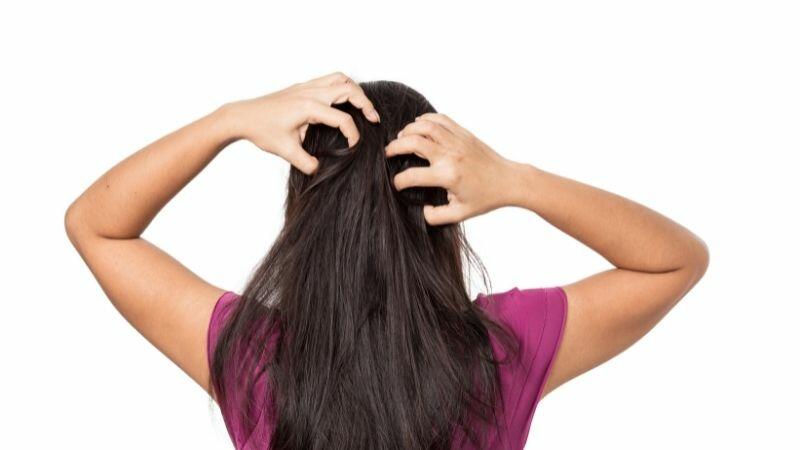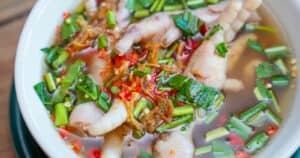If you’ve noticed more strands than normal circling the drain after a mouth-searing meal, you may wonder if your favorite hot sauces and chili peppers are secretly sabotaging your luscious locks.
It’s a common question many
The good news is – spicy food alone is very unlikely to lead to true permanent hair loss for most people. Research doesn’t support a direct cause-and-effect between indulging in zesty cuisine and going bald or thinning.
However, there are some ways spicy dishes could potentially contribute to temporary increased shedding in those prone to conditions like dandruff or seborrheic dermatitis. Essentially, capsaicin may fan the flames of existing issues leading to short-term extra hair fall.
Keep reading to learn more about the science linking spicy food to itchy scalps, dandruff woes, and temporary hair loss. We’ll also provide tips to nurture your mane back to a lush state so you can keep enjoying fiery flavors worry-free!
Can Spicy Food Really Cause Hair Loss?
Here’s the short answer: spicy food alone does not directly lead to hair loss in most cases.
While anecdotal reports of increased shedding exist after eating fiery dishes, limited research supports a direct causal link between spicy food and permanent balding or thinning. However, there are some ways capsaicin-rich foods could potentially contribute to temporary increased shedding in susceptible individuals.
Spicy food cannot damage hair follicles or impact the growth cycle alone. But it may indirectly exacerbate other underlying conditions that lead to periodic increased hair fall. Read on to learn the possible connections and when to worry.
Why Does My Hair Itch When I Eat Spicy Food?
Ever desperately wanted to scratch your head after polishing off some buffalo wings or a curry? An itchy scalp after spicy food occurs due to:
- Capsaicin – This compound in chilies binds to pain receptors, triggering inflammation and nerve reactions. This can cause itching and sensitivity.
- Sweating – Spicy food raises body temperature and induces sweating. The dampness of sweat on the scalp causes irritation for some people.
- Allergies – In rare cases, allergies to certain spices like black pepper or cinnamon may cause itching hives.
- Preexisting conditions – Spicy food can worsen dandruff or skin conditions like seborrheic dermatitis, psoriasis, or eczema already causing an itchy scalp.
Luckily, the itchiness is temporary and resolves as capsaicin works its way out of your system. An anti-itch shampoo can provide relief.
Does Spicy Food Cause Dandruff?
While spicy food itself doesn’t cause dandruff, it may exacerbate existing flakes and itching.
Dandruff forms when dead skin cells build up on the scalp faster than normal. Spicy dishesRaise body temp and blood flow, accelerating cell turnover. For those prone to dandruff, this can increase flaking. Sweating from heat also creates an ideal environment for yeast – a dandruff contributor.
Limiting spicy food can help reduce irritation and inflammation that worsens dandruff. An anti-dandruff shampoo helps control flare-ups. See a dermatologist if symptoms persist despite diet changes.
Spicy Food Effects on Other Hair Types
While spicy food is unlikely to cause permanent hair loss for most people, its effects may vary for those with different hair types.
Curly Hair
The sweating and sebum production induced by spicy food can weigh down delicate curly textures. This can stretch out curl patterns. Limiting fiery foods helps maintain bounce.
Oily Hair
Capsaicin may increase sebum production, making oily hair appear greasier and limp. Reducing spicy intake and shampooing more often can control slick strands.
Color-Treated Hair
Some research indicates capsaicin may degrade hair color over time. To help bright hues last, limit daily spicy foods and use protective products.
Dry Hair
Fiery foods can dehydrate hair and cause brittleness. Condition well and hydrate with masks to prevent breakage. Also drink plenty of water to counteract spicy food’s drying effects.
Damaged Hair
If hair is already compromised from overprocessing, the inflammation from spicy cuisine can cause more breakage. Avoid additional stress to fragile strands by minimizing fiery dishes.
While spicy food likely won’t directly lead to balding for any hair type, curtailing intake may help reduce potential drying, oiliness, frizz, color fading, and damage based on your hair’s needs.
Does Spicy Food Make Your Hair Grow?
This is a myth not supported by research. However, a few spices like cinnamon, rosemary and ginger demonstrate potential to:
- Boost circulation to the scalp when applied topically – improving hair follicle health
- Reduce inflammation – which can hinder growth
- Neutralize free radicals from UV and pollution damage – preventing breakage
So while spicy food itself doesn’t impact growth, incorporating some antioxidant-rich spices into your diet or products may provide some benefit to hair health.
Can Topical Spicy Remedies Improve Hair Health?
While eating spicy foods may not directly impact hair growth, incorporating certain spices into topical treatments could provide some benefits.
Some research indicates that compounds in spices like cayenne pepper, cinnamon, ginger, and garlic may:
- Stimulate blood circulation to the scalp when applied topically. Improved blood flow provides hair follicles with nutrients for optimal growth.
- Exhibit anti-inflammatory effects. Inflammation at the scalp can inhibit hair growth. Certain spices contain antioxidants that may help reduce inflammation.
- Block DHT. This hormone contributes to pattern baldness. Some
spice compounds may suppress DHT activity on follicles. - Eliminate fungal overgrowth. Spices like neem have antifungal properties to treat dandruff caused by fungus.
- Add shine. Spicy oils help smooth the cuticle for reflectivity and luster.
While more research is needed, incorporating spices into oils, masks or shampoos could potentially boost scalp health, reduce damage, and improve hair shine. But be sure to dilute and patch test first to avoid skin irritation. Consult a doctor before using any homemade spicy remedies.
Can Spicy Food Worsen Hair Loss Conditions?
Spicy meals alone won’t cause permanent baldness. But capsaicin-rich foods may potentially exacerbate two common types of temporary hair shedding:
Telogen Effluvium
This condition causes excessive resting hair to shed months after a stressful event. It’s speculated that in some cases, the body’s physical stress response to intense capsaicin may prompt telogen effluvium flares.
Seborrheic Dermatitis
This scalp condition characterized by inflammation, flaky buildup and itching can worsen from spices. The heat, sweating, and irritation may amplify symptoms that cause hairs to detach. Managing seborrheic dermatitis is key.
In both cases, limiting intake of fiery foods may reduce incidence of temporary increased shedding. But speak to your dermatologist to identify and treat the root condition.
Tips To Reduce Hair Loss Risk From Spicy Food
To help your hair stay resilient if you love spicy cuisine, try these tips:
- Rotate mild and spicy dishes – Avoid eating fiery foods daily to minimize scalp irritation
- Limit sun exposure – Sun can worsen inflammation from spicy food. Cover up or use protective products.
- Rinse hair after spicy meals – Wash away sweat before it irritates scalp. Use a gentle shampoo.
- Treat dandruff promptly – Control flaking and itching with anti-dandruff shampoos containing zinc, selenium or tar.
- Get scalp massages – Massaging boosts circulation to hair follicles and reduces stress hormones.
- Take hair-friendly supplements – Biotin, iron, zinc and antioxidant vitamins support healthy locks.
When To See A Doctor
Consult a doctor or dermatologist promptly if you notice:
- Sudden increased shedding after spicy meals
- Bald patches or widening part line
- Scalp redness, burning or pus-filled bumps
- Ongoing dandruff despite haircare changes
- No reduction in shedding after eliminating spicy food
These may indicate an underlying condition like alopecia areata, scalp infection, or other hair loss disorder unrelated to diet. Proper treatment can help get your hair growth back on track.
The Takeaway
For most people, indulging in spicy buffalo wings or hot salsa in moderation poses no risk to their lush locks. But individuals prone to inflammatory conditions like dandruff or seborrheic dermatitis may want to limit intake of fiery foods to avoid exacerbating temporary increased shedding. With proper scalp care and treatment of underlying conditions by a doctor, you can safely enjoy zesty cuisine without extra strands coming along for the ride.





